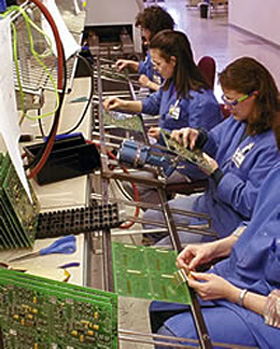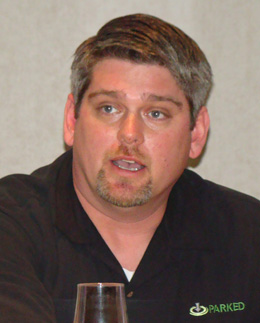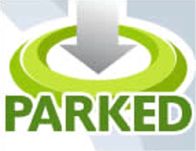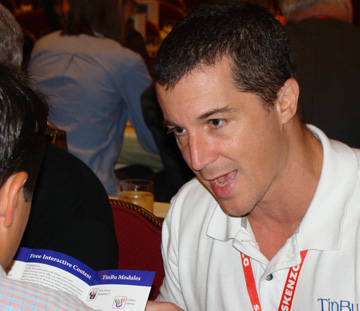|
By
Ron Jackson
Domain name portfolio
owners have long dreamed of a day when it would be
possible to affordably develop a large number of their
names at once. That day is now here, but there are
still many questions to be asked. The most important
one being "will mass produced mini-sites make
more money for me than the traditional solution, domain
parking?"
We set out to get the
answer to that and other questions about a rapidly
growing new sector of the domain industry devoted to
mass development. Since this category is so new (most of
the companies started offering their services just
months ago) there aren't many long term track records to
go by yet. That being the case, we called on top
executives at five of the best known companies in the
space (in alphabetical order); AEIOU.com,
DevHub.com,
SiteGraduate.com,
WannaDevelop.com
and WhyPark.com
and questioned them at length about the services they
provide.
|

Mass
production has been introduced
to website development. Could this
be a marriage made in heaven? |
|
As was (and still is) the
case with parking companies, we think the smartest thing
to do is to review what each of the mass development
companies offers, then test several of the services to
see how they perform for you. Keep in mind that it
takes time before development will start producing
new traffic for your domains. You may want to test with
domains that have received little or no traffic while
parked to see if mass development services can breathe
life into them.
|

Mass
website development is a new
space but it is already getting crowded. |
You will have even more
options to choose from in the weeks ahead. At press
time, we were aware of two more newcomers (both with
ties to well-known figures in the domain industry) who
are about to roll out solutions of their own. We plan to
take a look at those as they develop and will likely
produce a follow-up article to complement this one.
So why is everyone trying
to crowd into the same phone booth all of the
sudden? The primary reason is the dramatic decline in PPC
(pay per click) revenue over the past year. Prior to
that most were satisfied with the healthy revenue good
domains earned from current parking platforms. Now they
are desperate for a way to offset the PPC decline and
mass development looks like it could be a viable
alternative.
By having content added to
your landing pages you may be able to attain higher
rankings in the search engines which in turn would drive
more traffic to your domains. If the content is
regularly updated by your service provider (or by you)
there would also be a reason for people to keep coming
back to the site. That increased traffic can be
monetized in a number of ways including the old standy, Google
AdSense, as well as options like affiliate programs,
lead generation or selling space directly to
advertisers. |
The problem domain owners
have always faced is that full scale development
can be expensive and it is extremely time
consuming. For most individual entrepreneurs
it would be impossible to develop more than a handful of
decent websites in the course of a year. The new mass
development companies have come up with a middle
option between parking and full scale development
that relies on what are typically called mini-sites.
These usually have a limited number of pages that can
be added to as time goes on. Content is plugged in right
away by the service providers and most allow you to add
your own (or third party content) as well. SEO techniques are often
employed too and the end result, proponents claim,
is an increase in traffic and return on investment for
the domain owner.
|
Before we let leaders from
the mass development companies make their case for
moving beyond parking, we wanted to make sure the scales
are balanced by having a leader from the parking
industry, Parked.com President Donny Simonton,
comment on the new mini-site "craze" and how
he thinks it stacks up against today's PPC providers as
a monetization solution.
"We keep track of every
domain that goes in and out of our system and where
they go if they do leave us," Simonton said.
"I havenít seen a single ďbigĒ domain move to
one of these mini-site/content companies as of yet.
We have seen people who have domains parked with us that
donít generate any hits or revenue move their domains
to some of these content/mini-site companies and then
usually a few months later the domains are back with
us, but now they have traffic and now they are
making money. So the mini-site/content companies do
help domains get traffic."
|

Donny
Simonton
President, Parked.com |
|
|
"I think one of the
big advantages to the small companies like this, is they
donít have to follow all of the same rules that we
have with Yahoo or Google on how a page
has to look and what can be on a domain. They can
add some really unique content to hopefully get placed
high in the search engines, but at the end of the day, you
have to make money to be able to even renew your
domains and this is where most of the mini-site/content
companies need the most help. I have tried most of
the mini-site/content companies and I definitely think
they have a place in the business," Simonton
said.
Like many other PPC
companies that have evolved and innovated over the
years, Parked.com allows customers to add a lot of
their own customized content to their parking pages. The
PPC companies have also been around for years and have
strong brand recognition so you have to wonder, if the
new mass development companies start taking away a
significant portion of their market share, would they
enter the mini-site space themselves?
| "We are always looking
at different ways to help our customers monetize their
domains better," Simonton said. "There are
some advantages to adding content and some
disadvantages as well. The two biggest
advantages are that the domains could be get |
|

|
more search
engine traffic because of the additional content and the
domain may look more like a real site. The biggest
disadvantage is that when a site has content on it the
click thru rate is about 30% less than it was
without content on the page. Coming up with a way
to combine a domain parking feed and a content system
would be the best of both worlds, if you could come up
with a way of keeping the CTR (click through rate) high."
I asked Simonton how Parked
is planning to offset the revenue decline in the PPC
industry, how they will |
| counter the mini-site challenge
and, given the poor outlook for the general economy,
what he sees as the prospects for domain monetization,
regardless of platform or approach, in the year ahead. |
"We have all seen that
the revenue from domain parking on a domain level is
down compared to this time last year," Simonton
said. "The traffic is still there, the
clicks are still there, but the RPC (revenue per click)
is just not the same as it was before. The
lower RPC is mainly because of the economy the
advertisers just arenít paying what they did last
year. We could always just focus on improving the
RPC but that usually means that you have keywords that
are not the most relevant for the surfers, this is why
we always focus on the most relevant keywords which is
why we have the highest CTR in the industry today."
Simonton added, "I
think with the changes in the economy you will have
less domainers at this time next year. You
will see a lot more consolidation in the domain
parking, registrar, and mini-site/content companies over
the next 12 months. But the most important
thing I see is that you will see a new
product/company rise up with a unique twist and mash all
of those individual products into one."
| Now let's see what leaders
in the mini-site space have to say. Each company
we are profiling has their own unique approach to
solving the task of mass development. Our exclusive
interviews with the individual company leaders will fill
you in on who is behind each company (and their level of
development experience) as well as what strategy they
employ in an attempt to bring the most traffic to the
sites they produce for you.
Since most of these
platforms allow you to add your own or third party
content to what they provide, we also have a bonus
profile about Tinbu.com, a rapidly growing
provider of free auto-updating content that you can install on your own
sites. |

Tinbu.com
VP of Marketing Peter Hayward
discussing the company's services during a
networking session at T.R.A.F.F.I.C. New York. |
We are devoting a separate
section to each company so that you can easily go
directly from this page to each one you want to learn
about and do so in any order you wish. You will also
find links to all of the companies at the end of each
individual profile page so you can easily navigate
through them one by one as you compare what the various
services provide.
There is a ton of
valuable information in this report so you may want
to come back to this intro page repeatedly as time
allows to continue your reading and research on these
new monetization solutions. Without further adieu, you
can begin by clicking any of the links below to read
our exclusive interviews with leaders of the innovative
companies that are making mass development a mainstream
option.
|















